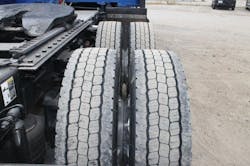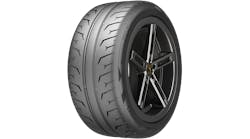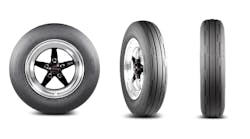Apollo Tyres is taking aim at the North American commercial truck tire market with the introduction of Apollo brand medium truck tires next month.
The roll-out represents the culmination of nearly five years of research and three years of real-world testing by trucking fleets across various vocations, says Abhishek Bisht, assistant vice president, Americas, Apollo.
“The plan is for the tires to be physically available in the United States and Canada, starting in May,” says Bisht, who also is responsible for Apollo’s Vredestein consumer tire brand in North America.
“North America is clearly one of the largest medium truck tire markets in the and it is one of the most sophisticated. We’ve been eyeing this market for quite some time and we’ve been preparing to launch for almost the last five years.
“We’ve done a lot of research to understand the relationships and decision-making parameters to draw up a very strong value proposition for both dealers and fleets.”
Regional first
Phase one of Apollo’s North American strategy will see the introduction of regional and “super-regional” truck tires, as well as tires for mixed and severe service applications, according to Bisht.
“Regional and super-regional, together, comprise the largest part of the market. In our estimation, this is the ideal segment to start with and it’s in sync with our distribution strategy.”
Over time, “we’ll also address the trailer tire segment, as well, and both the open and closed shoulder categories.”
Phase two, which is scheduled to start 10 to 12 months after the beginning of phase one, will include the roll-out of long-haul tires.
Bisht says that Apollo ultimately wants to address all truck tire product categories. “However, it will be done in a phased manner.”
The tires, which will be marketed under the Endu family name, will initially be manufactured at Apollo’s plant in Chennai, India.
“Our very experienced research and development team is based in India” and the company has a similar team that is based in the Netherlands.
“We have very experienced people. And having made excellent products in other parts of the world really helps.”
Apollo brand truck tires have been sold in different regions for more than 40 years, says Bisht. “At one end of the spectrum, you have severe application markets in India. At the same time, you have markets like Europe.”
Some production will transition to Apollo’s heavily automated plant in Hungary.
“Within 24 months from now, North America will be receiving products” from both India and Hungary.
“All of our factories produce the same quality. They are at different levels of automation but their output is consistent.”
Extensive evaluation
To verify that its commercial truck tires could withstand the rigors of North American applications, Apollo began seeding the products to fleets for real-world, on-the-road testing three years ago.
“The first thing we wanted to do was remove any kind of bias that we might have in this test process,” says Bisht. “We got it done through a third party testing agency that would stand by the test results.”
It was important to Apollo that its truck tires were benchmarked against tier-one tires.
"We are not going by price segment or tiers. We’re benchmarking and performing against the best in the industry.”
Apollo products have been in testing for 36 months “and well in excess of multiple millions of miles. And now some of those tires are going through their third retreads. We’re not just performance testing for initial tread life. We’re also testing for casings.
“We’re making sure they are being evaluated and retreaded by different retreaders, so we get a very complete view of their performance. They are highly retreadable tires.”
Dealers wanted
Bisht says Apollo understands that it must partner with established truck tire dealers in order to establish a presence in North America.
“The spirit of our company is that we collaborate with existing networks because we feel they are the ones who are best-poised to serve the customer. There are no intentions of having our own distribution centers in the U.S. and Canada, nor do we intend to sell directly to fleets.
“Our distribution strategy will include offering contractual exclusivity,” notes Bisht. “We are very serious about this. It’s not difficult to ship tires in containers, but we wanted to do this right.
“Based on all the market research we’ve done, our feeling is that the current set-up of the commercial truck tire distribution structure is too complex. We are looking for a few - but long-term - business partners.
“We are not putting any size constraints on our requirements. We will be able to cater to any size of orders. The major requirement is that they be servicing dealers.
“They should be able to fit our tires on-site, first and foremost. They should have existing fleet relationships. And they should be able to service fleets by offering breakdown service and other associated services.”
Number of locations will not be a limiting factor as Apollo builds its network, according to Bisht.
“If it’s a servicing dealer with many outlets, that’s fine,” he says. “If it’s a servicing dealer with fewer outlets, that’s also fine. As long as the dealer syncs together well with our national distribution plan, we are fine with either.”
Warranties and pricing
Apollo truck tires will come with what Bisht calls “a standard, 72-month, two-retread warranty. What is exceptional is that we will offer a free road hazard warranty for the first 25% of the tire’s wear.”
This includes mixed service and severe service tires, he adds.
The company will offer “a more lucrative price in order to establish ourselves and allow the maximum number of dealers and fleets to evaluate our tires. We’ll be starting from a tier-two price position and we’ll see how things go from there.
“It’s a long-term strategy,” says Bisht. “Short-term, it’s establishing our network. But long-term will be realizing the vision of selling the right amount of tires in the marketplace.
“We want our potential dealers to focus on the thing they do best - which is servicing the fleet - rather than worrying about negotiating with the manufacturer.”




